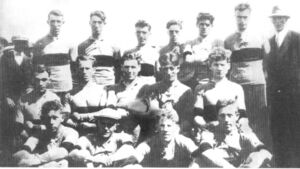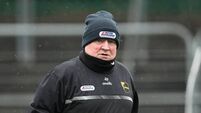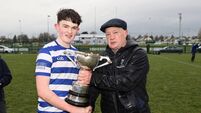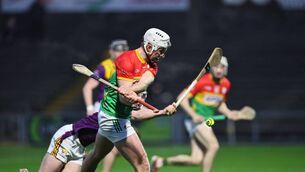“A double conviction for the one offence”

The Kilbride team of the 1930s
“How is it that Kilbride who are credited with winning only one Carlow Senior Football Championship title won two finals?! Make sense of that people!” The words, you may remember, of FBI Special Agent Jubal when flown in to Ireland to help kick-start a series of Cold Case investigations on our county’s flagship football competition ahead of the imminent publication of ‘Every Kick of the Ball’, a supplement to be published by this newspaper before Christmas carrying comprehensive records on the championship’s 129 year history.
“Ah yes, Kilbride,” nodded a local agent, “they won the SFC in 1935, the roll of honour is correct but the fact that they won two finals is also correct and they won both of them in 1935 too.”
Jubal, who doesn’t suffer fools gladly, stared at the agent and asked if he’d been drinking. But thanks to ‘The Nationalist’, the paper of record, the local agent was able to source the answer. In virtually all previously published results the county final of 1935 was recorded as Kilbride 3-6, Leighlinbridge 1-3. That game was played in ’The Bog’ in Bagenalstown on Sunday September 29th, ’The Bog’ being an affectionate title on a popular venue down a fall of ground on the banks of the river Barrow. Kilbride had a strong team back then, taking ownership of the prestigious Feis Cup by winning it three times, the third victory in June 1935 and, presumably, on that late September Sunday in ‘The Bog’ the wearers of the red and green were presented with the Haughney Cup, then the symbol of Carlow football championship supremacy.
However Leighlinbridge, popularly known as the ‘All-Blacks’ objected to the result and were awarded a re-fixture, a re-fixture played on Sunday, November 3rd at the O’Hanrahan’s Grounds (the Barrack Field near Granby Row). Kilbride won again, this time by 2-2 to 1-0 but apart from a very small report in ‘The Nationalist’ the week after that final the game was airbrushed out of history. Until now!
The story of that objection, the conundrum the County Chairman found himself in and the possible reason the re-fixture result didn’t become part of local folklore was, we promised, worth a column to itself. ‘Watch this space’ we warned! Well the time has come...
On October 9th, 10 days after the 1935 final, a meeting of the Carlow County Board took place in Bagenalstown, Tom Ryan, NT, in the Chair, Martin Lynch serving as Secretary, two very experienced officials. The referees reports of the various matches were read and adopted. Adopted that is until it was revealed that the report of the referee of the Senior Football Final (Mr T Cribbin, Leix) stated that neither of the teams that participated handed in a list of names. Two days after the match representatives of the Kilbride team travelled all the way to him to give him the list of players.
Chairman: There is an objection in from Leighlinbridge. Mr Paddy Coyne: Does it arise in view of the refereees report. And that little exchange sparked off a debate involving several delegates that took up 10 times more space in this newspaper than the two match reports put together! Firstly it was argued as to whether the objection should be read before the referees report was adopted even though, as the Chairman pointed out, it actually amounted to the same thing, the absence of team lists. “It is a peculiar thing to occur,” stated Mr Ryan, “and perhaps one that never happened in Ireland before, that two teams in a county final should make the same error.” The Chairman later pointed out that “another point that might arise is Leighlin not being legal themselves, are not legal to object,” and again used the word ‘peculiar’ to describe the situation at which point his secretary, Martin Lynch said, “peculiar things crop up from time to time.” Now the same Martin Lynch played with Leighlinbridge in the game in question. He did not, however, play in the subsequent re-fixture, for what reason is not recorded. Perhaps he was injured or ill or perhaps he didn’t altogether agree with the technical nature of his club’s objection?
That Leighlinbridge objection was eventually heard, point one being “the match was void, no list of names given to the referee (Rule 16, page 69 of the Official Guide) while point two was “that the captain of the Leighlinbridge team did not get a list of names.” This was moved by David Murphy with the other Leighlin delegate Jim Kehoe having earlier suggested the referees report couldn’t be adopted as it was there assertion there was no competitive match, that in the absence of team lists the game in Bagenalstown was a ‘friendly’.
Kilbride delegate Mr M Brophy pointed out, and the Chairman agreed, that while the rule stated a list of names must be handed in before the game, the rule doesn’t stipulate any penalty! Also discussed was the standing of a list handed in at half-time or, in this case, two days after! The Leighlin delegate David Murphy admitted he only realised he still had their team list in his pocket after the game. The Chairman signposted the fact that if a replay was ordered and Kilbride refused to fulfil the fixture then Leighlinbridge could be declared champions even though they had broken the same rule. Paddy Coyne (Carlow) and Paddy Butler (Bagenalstown) both asked Leighlin to withdraw their objection as did the second Kilbride delegate Mr Murphy, all three suggesting it would be “the sporting thing to do” but the Leighlin delegates refused while the Chairman’s suggestion that the club’s come to an agreement also fell on deaf ears.
Tom Little (O’Hanrahans), a highly respected official, told the meeting there were three courses of action open to them, one is to have the objection withdrawn, the second is to order a replay, the third is that there be no champions. This was a view with which the Chairman was in agreement and Mr Ryan ruled “as both teams did not comply with the rules there was not a championship match, the match was void. All that can be done is to re-fix the match.”
While early in that Co Board meeting Kilbride insisted they would not agree to a replay when it was forced on them they manned up and in the ‘Tullow Notes’ the week after the re-fixture we read “It will be remembered that Kilbride easily beat Leighlinbridge some weeks ago, but an objection, untimely, unpleasant and trivial brought about a replay. The cup of victory is made more palatable by this second convincing win and universal congratulations are correctly accorded our new senior champions—Kilbride.” The re-fixture received very little coverage, suggesting there wasn’t an appetite for the game and in a small preview before the second final we read of ‘dissension’ in the Leighlinbridge camp.
Who better to give the last word on this controversial final than esteemed Nationalist columnist Tommy Lynch of ‘Ogled Out in Old Leighlin’ fame, a brother of the aforementioned secretary/player Martin Lynch. Tommy was a man with his finger on the pulse of parish events and the week after the ‘replay’ as well as remarking that Leighlin fell under the same ‘sins of ommission’ as Kilbride writes “The All-Blacks got a duplicate of September 29th - a double conviction for the one offence.”
Right, from that 1935 final that was very nearly declared null and void to another final that we have reason to believe was declared null and void, that of 1926. In the 1985 Carlow SFC Final programme an article penned by Jim O’Brien states:
“Following the game at Rathoe which was abandoned, Carlow Co Board wired off all games for the following Sunday and called a meeting of the Co Board at which Milford were awarded the match, and Carlow-Graigue were suspended for two years. The latter appealed to Leinster Council, and there was some delay in it being heard as Fr Lawler did not attend the first meeting of the Council. However, he as Co Chairman represented the Co Board and made a long and strong statement in support of his decision. Mr P Haughney, Co Secretary and a member of Leinster Council represented Carlow-Graigue (Mr M Murphy was also present). The appeal was based principally on the illegal constitution of the Milford team ie in that Francis R McDonald (Rexie) having been suspended for playing rugby was illegal (suspension was up the month following the game) and on the referee’s report, which seems unbiased and which stated the game was tough but not rough and that the cause of the spectators invading the pitch was the striking of a Graigue man. He blamed the spectators. Fr Lawler stated they (spectators) deliberately set out to have the match called off. There were seven minutes remaining, Milford leading by four points, the game was as good as over, was it to be a Co Board or not, and that the residents of Tullow were terrified at the scenes which took place there after the game. John ‘Mallet’ McDarby has always claimed to the writer that the cause of the row rising in Tullow was that the word “had come” their player was dead. A few years previously the club had a player accidentally killed in the Milking Fields at Carlow v Palatine when he was caught in a sandwich.
In any case the appeal was lost, 13 votes to 2, Fr Lawler refusing a compromise. Obviously the matter did not rest there, because later he write to Leinster Council informing that Mr Patrick Byrne, and Mr Patrick Butler were the newly appointed Secretary of Co Board and Leinster Council delegate respectively, and that Mr R McDonald had been suspended for a further six months for playing while under suspension and that Milford had been warned and deprived of the senior medals and of the Governey Cup.” The words in bold were boldened by the ‘85 author. The Governey Cup was in fact officially the Haughney Cup but had bee presented by the Governey family in memory of Denis ‘Buller’ Haughney, the player who lost his life after that unfortunate incident in Milking Fields.
“




